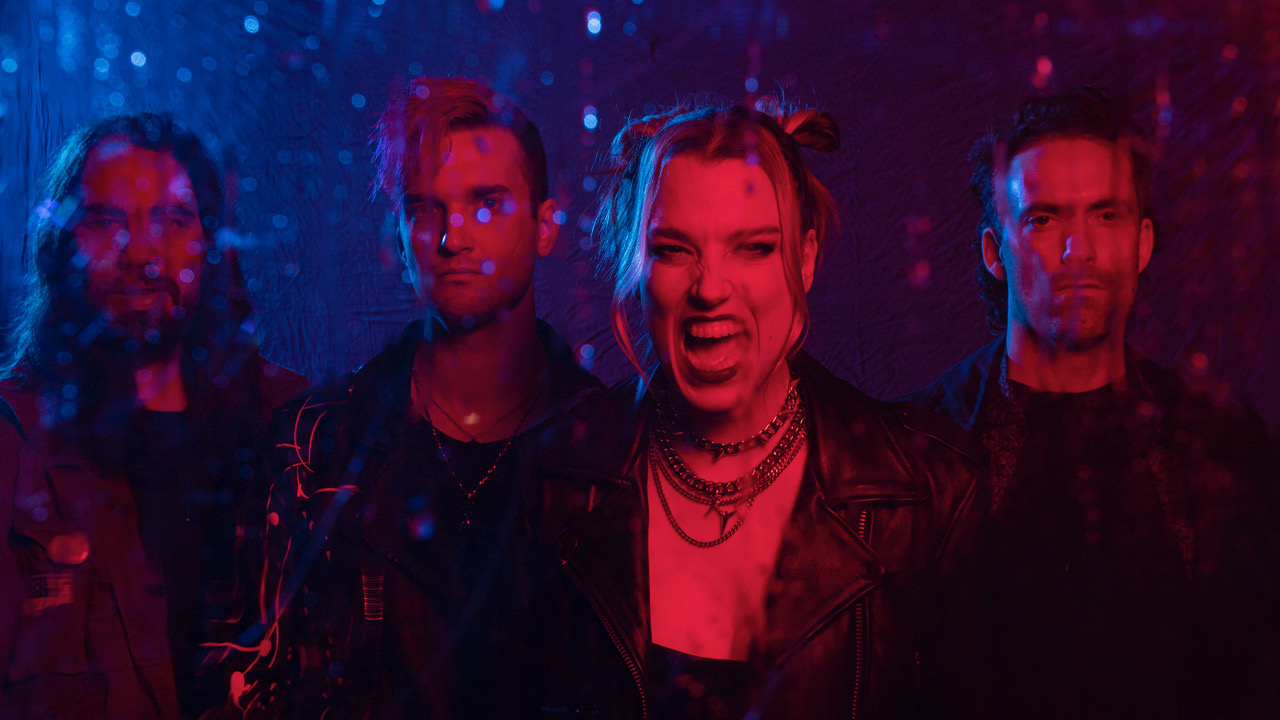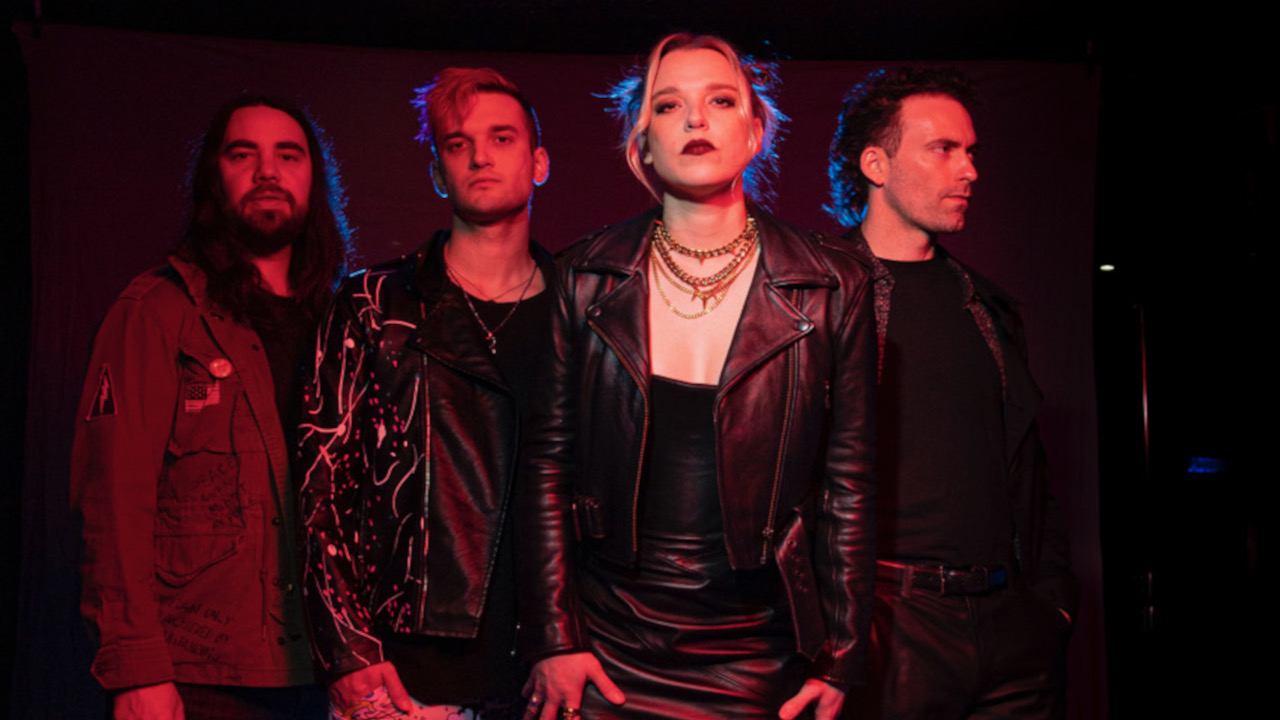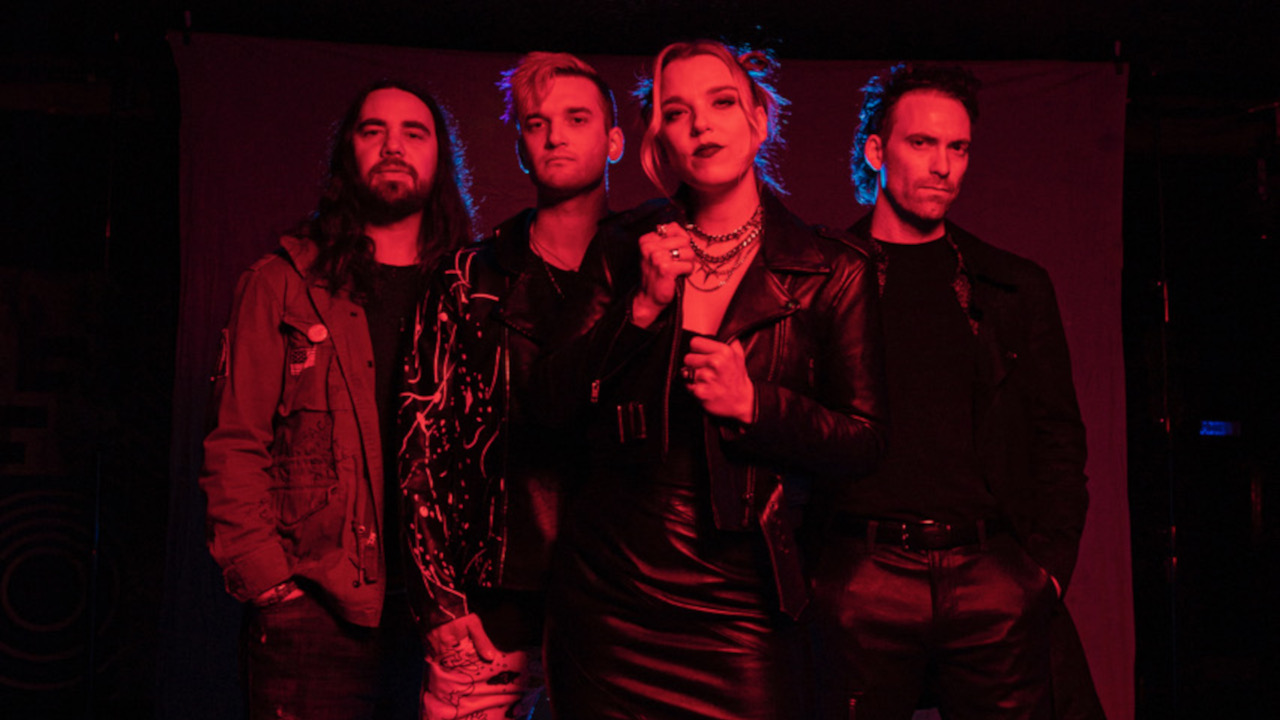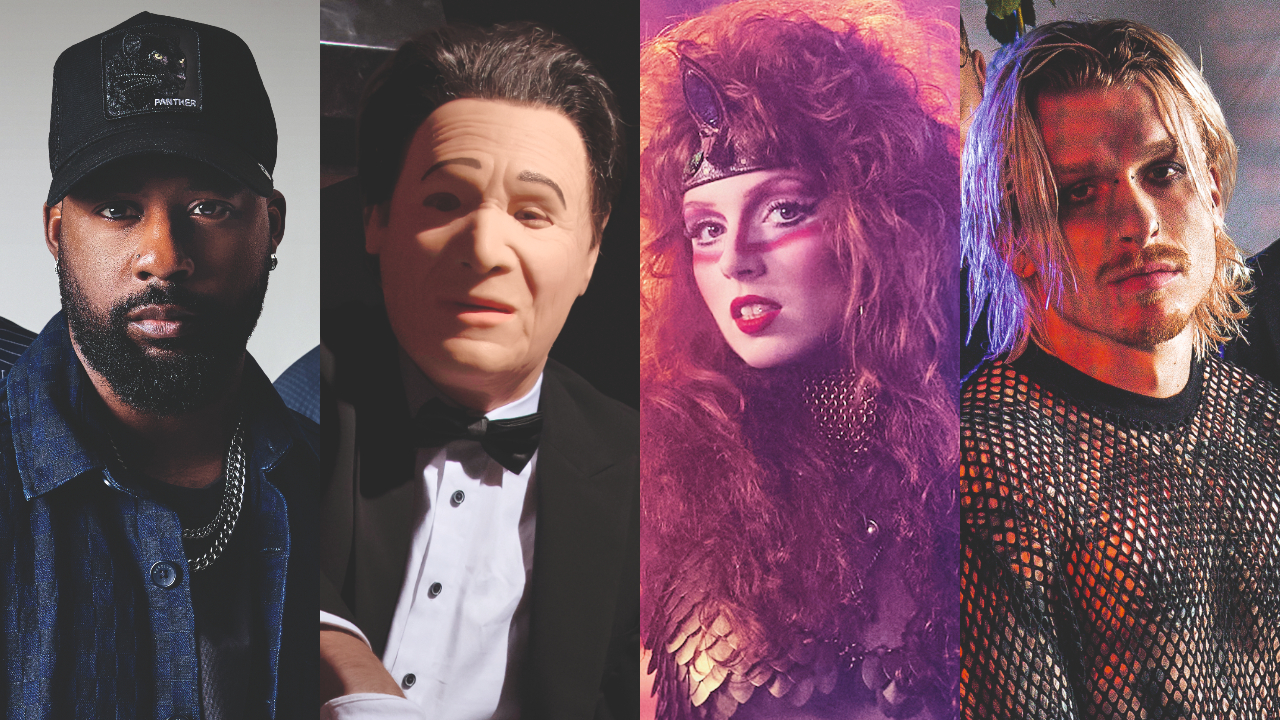Lzzy Hale: "I have a case of the f***-its, that can be dangerous"
Inside Back From The Dead: the album that brought Halestorm back from the brink of oblivion and anxiety hell

Select the newsletters you’d like to receive. Then, add your email to sign up.
You are now subscribed
Your newsletter sign-up was successful
Want to add more newsletters?

Every Friday
Louder
Louder’s weekly newsletter is jam-packed with the team’s personal highlights from the last seven days, including features, breaking news, reviews and tons of juicy exclusives from the world of alternative music.

Every Friday
Classic Rock
The Classic Rock newsletter is an essential read for the discerning rock fan. Every week we bring you the news, reviews and the very best features and interviews from our extensive archive. Written by rock fans for rock fans.

Every Friday
Metal Hammer
For the last four decades Metal Hammer has been the world’s greatest metal magazine. Created by metalheads for metalheads, ‘Hammer takes you behind the scenes, closer to the action, and nearer to the bands that you love the most.

Every Friday
Prog
The Prog newsletter brings you the very best of Prog Magazine and our website, every Friday. We'll deliver you the very latest news from the Prog universe, informative features and archive material from Prog’s impressive vault.
Lzzy Hale learned about the power of using your voice when she was in the first grade. Although, back then, the firebrand rock singer was having none of it.
“We were having a fire drill and the teachers were trying to teach us that if you’re hiding anywhere, if you’re in a closet when there’s a fire, you need to learn how to yell out for the firemen so they know you’re in there.” She chuckles at the irony. “Apparently, I wouldn’t do it. Which is funny, because most of my career is built of yelling at this point.”
To chalk up Lzzy’s success to “yelling” is underselling it. Halestorm’s no-frills, balls-to-the-wall hard rock is big, brash and accessible enough to court the mainstream, but it’s Lzzy’s gale-force, instantly recognisable howl and life-affirming lyrics that give the band their emotional heft and have marked them as one of heavy music’s new guard, genuinely capable of filling arenas.
Since Lzzy started the band, aged just 13, with her brother, drummer Arejay Hale, she’s evolved into a modern rock icon: she’s openly bisexual, an LGBTQ+ ally, a proud mental health champion, and a figurehead for a devoted fanbase who have adopted her songs as anthems of empowerment and resilience.
Today, she and her partner of 18 years – Halestorm guitarist Joe Hottinger – are visiting Joe’s parents, each conducting their own press interviews for the band’s triumphant fifth album, Back From The Dead.
Of the two, Lzzy got the better deal: while she chats to us via Zoom from a sun-drenched balcony, Joe is cooped up inside in the next room. She seems relaxed and happy. With her bleached blonde hair tied into a messy ponytail, her eyes shaded by oversized sunglasses, she oozes an effortless star quality and is eager to chat about the new record, which candidly charts the emotional highs and lows of her pandemic experience.
She tells the fire drill story to illustrate how “painfully shy” she was as a child. When she was 11 or 12 years old, she began suffering from intense panic attacks in the middle of class. Scared, and unsure what was happening, her teachers sent her home from school – although depression and anxiety had run in her family for years, it wouldn’t be until years later that she recognised her symptoms for what they really were.
Sign up below to get the latest from Metal Hammer, plus exclusive special offers, direct to your inbox!
Life changed in the eighth grade, as she reached her teen years. By that point she had discovered heavy rock, watching videos of Dio and Pat Benatar that had lit a fire under her imagination, and she and her brother had broken out of the basement of their family home to play gigs at local shopping malls.
Looking back, Lzzy describes those early performances as a “trial by fire”, a battle between the far-off dreams of a young teen and a reality grounded in anxiety. “The more I was forced to be onstage, that want to perform overrode that fear,” she says.
By 2019, Halestorm were enjoying their biggest year yet. The band, still riding high off the back of their last album, 2018’s Vicious, had completed their first-ever UK arena tour, supported by In This Moment. They had been nominated for their second Grammy, Best Rock Performance, with their single Uncomfortable, having won the award in 2013 for the single Love Bites (So Do I). And at the start of 2020, they were meeting at the Nashville home of Lzzy and Joe for regular jam sessions in the basement as they started working towards their fifth album.

When the pandemic hit, Lzzy was lulled into a false sense of security, initially seeing lockdown as an “interesting little adventure for us to get through, kind of like a snowed-in day”. As Joe explains, Nashville “never actually closed down” but he and Lzzy hibernated at home.
Having spent the last 17 years pretty much constantly on the road, she relished the opportunity for some ‘me’ time. “It’s really hard for me to do nothing,” she explains.
“When lockdown first happened, I started using it as an excuse to do nothing. Everyone was delivering to your door, so I’m like, ‘I’m gonna order pizza.’ There was a brewery that delivered right to your door, so we’d get beer every week – a case of stuff. Like, ‘This is awesome, just like a backstage party the whole time.’”
As we all now know, those first few weeks turned into months. For Halestorm, it was the longest they had gone without playing a gig or seeing each other. For Lzzy, the problem was much bigger than the band. It was the longest she had gone “without having a mission, a purpose”. She realised the band had become “an extension of me, an extension of my personality”.
“When I was left without this armour I had put on myself, all of a sudden I was vulnerable to all these things that I hadn’t been vulnerable to for a long time,” she explains. “I had to figure out how to deal with it without this ‘Lzzy Hale’ character.
“You start looking at yourself in a different light, and there was a side of me that I did get introduced to which I hadn’t seen in a while. There was the juxtaposition of Lzzy Hale onstage, who is no longer really active right now…” She interjects with a throaty, self-deprecating chuckle. “Haha, please leave a message, she’ll get back to you. And then there’s the Elizabeth Hale who’s been on the couch in her pyjamas for three days wondering what the future holds.”
Questioning her self-worth as uncertainty stretched out in front of her, the anxiety that had plagued her in her youth started to creep up to the surface. “I was just like, ‘Man, I have all these things I could accomplish, but I don’t feel like doing anything,” she explains.
“I remember at one point Googling my thoughts and symptoms and being like, ‘Oh my gosh, it’s back.’ At the time, I was like, ‘Why is this happening now?’ I suppose because I was out of my element for the first time in a long time.”
Lzzy describes the last two years as “a journey of rediscovery”. When Hammer caught up with her right after the band had finished recording Back From The Dead, she said, “When I didn’t have that outlet for music and I was missing the community of the live show, you realise you can’t fill that hole with anything else. There was a period of time when we were all drinking too much or trying to fill the void with other things.”
She alludes to that a little more on the drolly upbeat Back From The Dead track, Brightside: ‘Fake a smile and self-destruct… Everything, I’m choking on, is supposed to help, and keep me hanging on.’
Today, when asked to elaborate, she takes a deep breath before answering carefully. “I got to know a little bit about myself. I don’t know if I should call it addictive tendencies, but I know I can go there if I’m not careful. I don’t think I would have realised that if we hadn’t gone through that. If you don’t have those responsibilities… that North Star that’s the most important thing in your life… it’s very easy to fall into those rabbit holes of… I keep calling it, ‘I have a case of the fuck-its.’ That can be dangerous.”
Through it all, her rock was Joe, who she describes as the “angel” in their relationship. “He saw my demeanour change,” she continues. “He saw me go from being this very confident, determined person to the complete opposite. I started worrying about silly things that I haven’t worried about in years, like worrying about the way I look or worrying about my future.”
When we speak to the guitarist on a separate call, he agrees that the change in Lzzy was palpable and worrying. Keen not to speak on her behalf, while he refers to her pandemic experience as “a learning experience for both of us”, he won’t get into specifics.
“I’ve known Lzzy for almost 20 years now, we’re pretty in sync,” he says, answering our questions while being accosted by his parents’ two small dogs. Excited by the extra company in the house, they run in and out of camera shot, their tails swishing like mini feather dusters.
“We communicate really well. We talk about things right away and don’t let things build up; it’s a constant discussion. All you can do is be there and be supportive and raise them up. Just do my best to support, and try to counter any destructive forces with creative forces.”
Although Lzzy had already been going to therapy sessions before the pandemic, she “doubled down on that” as soon as she acknowledged what was happening to her. “It was really nice to have someone professional say, ‘Hey, it’s OK to feel these things. It doesn’t mean you’re broken or a bad person… it’s just your body trying to deal with what’s going on and these new old feelings.’”
At her lowest point, she had fallen out of love with making art. “I basically had to give myself a pep talk and be like, ‘Alright Lzzy. I don’t care if you like the songs that you write right now. Most likely, you’re going to sit down and the first five or six are going to suck, and you’re just going to have to deal with that, but you’re going to feel a lot better if you get through it,’” she remembers.
Yet, she worked through those emotions in the music. “All of these songs on this album are more or less from gibberish in all my journal entries, trying to write out my feelings and… almost try to recreate that happy place in my mind.”
In the end, though, it was music that pulled her through to the other side. In December 2020, the band headed back into Nashville’s Rock Falcon Studio where, with producer Nick Raskulinecz, they spent 12 months masked up and plugged in.
“We ended up being quite irresponsible the first times we were recording,” laughs Lzzy. “We were so excited to be back together again, we weren’t focusing on the songs, we were just jamming. So we have a full album’s worth of B-sides that are really weird that didn’t make it on the record.”
Following 2018’s Vicious, which was roundly criticised for being too polished, Back From The Dead is easily their heaviest album to date. “I didn’t think about that until an interview the other day,” admits Joe. “But you know, I think it’s the most consistent and consistently rocking album we’ve done. Even the ballads have weight to them in their own way. We weren’t thinking, ‘Let’s make it heavy.’ We just tried to be our best selves. But we like hard rock, we like riffs.”
Both Lzzy and Joe credit the album’s title track, Back From The Dead, as the song that would come to define the record. It’s an anthemic stomper – a hurricane of rising riffs and drums, the sound of a band forced into dormancy back doing what they do best, with the triumphant refrain: ‘Back from the dead alive / Hell couldn’t hold me / Back from the other side / Up from the dirt I rise.’
“We had all these songs written that were good, but we were questioning, ‘Is this strong enough, have we found that ‘thing’ yet?” remembers Joe. “Lzzy showed it to us and we were all like, ‘There it is!’”
“We all looked at each other like, ‘My god, this is so dumb. It’s perfect,” Lzzy says. “It’s exactly what we wanted to say.’”
You can feel that euphoria and sense of release in Back From The Dead’s cover art, an explosion of frustration and catharsis that shows Lzzy screaming through the camera from blood-red shadows, shattering a pane of glass.
She describes the whole album as a “story of survival”: “There is the mental health aspect and me trying to dig myself out of a hole, and there’s also the survival aspect that we’re back from the dead, and the forgiveness aspect of my redemption. It’s just the ebb and flow of all these things. We lived a couple of different lifetimes through this time, and this album is a snapshot of what we were going through.”
Unsurprisingly, Back From The Dead contains some of Halestorm’s darkest lyrics to date, although, in typical Lzzy style, even the rawest moments are turned into moments of empowerment. On crunchy rocker My Redemption, while the verse starts: ‘In a hole down so deep, suffocating from fear / running from purpose, while losing my grip…’ by the chorus, she’s flipped the narrative on its head: ‘I don’t need saving, to save myself… I’m my own redemption.’
I Come First sees Lzzy back in her element, a swaggering play on innuendo of self-worth and female sexuality, while on the raging Bombshell she takes aim at sexism in the music industry, giving short shrift to men who make the grave mistake of underestimating women who rock just as hard as they can: ‘She is not fragile like a flower / She is fragile like a bomb.’
When questioned further on this, she recognises her tendency to veer towards the positive rather than wallowing in darkness: “I needed to for myself but… I always feel better when I get it done, when I have something, and I’ve created something out of nothing.”
Elsewhere, the album is a call to arms to live your truest life. Despite her growing fame, Lzzy has cultivated a unique relationship with her fans, remaining more accessible than your average rockstar and responding personally to messages on social media, while she created the #raiseyourhorns hashtag to highlight the subject of mental health on Twitter. And, although she’s keen to offer the caveat that she isn’t a professional, she’s often reached out to fans with advice and support.
“Strange Girl was directly influenced by one of those conversations I was having,” she says. “There was a young girl I was talking to. She came out to her parents shortly before lockdown; they were absolutely not understanding at all. This is going to sound harsh, but it’s what she told me: her parents said death would have been better, to not even have a daughter. I took this conversation into one of our writing sessions and wanted to write her an anthem, in order to remind her we’re both one and the same and we’re in this together.”
Later, the track Steeple is an open love letter to the fans who she says were there for her at her lowest moment. “One of our fans, on an off-chance, said: ‘Hey Lzzy, you’re online. How are you doing today?’” she recalls.
“I had a moment of honesty and I said, ‘You know, honestly, I’m not feeling too good today. I’m sad and I’m not sure why.’ They reversed my #raiseyourhorns hashtag and were like, ‘Hey, let’s all send our horns to Lzzy!’ So when I went back online there were all these pictures of all these people saying, ‘We’re here if you want to talk to us, you’re always here for us.’ We made that bridge from ‘onstage’ to ‘fan’ a little bit shorter.”
The song itself feels like more than just obligatory lip service to the people who buy her music. With an anthemic, soaring chorus (‘This is my kingdom, this is my cathedral, this is my castle, these are my people’) it’s sure to become one of the most powerful moments of their live set.
“She is honest, she’s a positive human and always has been,” Joe tells us later, his voice full of admiration for his partner and bandmate. “She realises her role in a lot of people’s lives whether she knows them or not. She didn’t ask for that job, it just happened.”
“I’m not trying to create this facade that life is going to be great if you have the right outlook,” insists Lzzy. “It’s not. Life sucks, it’s weird; we still don’t know anything about it. But the positive thing is, if you’ve gotten through some of these things… you’ll still have those tools in your arsenal.”

As our call with Lzzy comes to a close, and the conversation turns to what she’s learned over the last two years, it’s clear that, after everything that went down during the pandemic, Lzzy Hale has changed forever. She’s still the same bona fide rock star who can command thousand-strong audiences and inspire a new generation of fans to follow their dreams. But then there’s the other side, the ‘Elizabeth Hale’ part of her personality, which is “anxious and definitely not as sociable as I would normally be”.
Most importantly, she says, her “strange, solitary journey” has shown her that it’s OK to be vulnerable.
“Now I feel like I think both sides of me can form an alliance,” she says. “We can coexist. I don’t have to be one or the other. I can be a mashup of the two. You don’t have to have that armour up… I don’t always have to be this beacon of hope all the time.”
After years of writing music with everyone in mind except herself, she admits her writing process for Back From The Dead was “selfish”. “I wasn’t thinking, ‘Is this too dark for our fans? Is our label going to like it? Is it catchy enough for radio?’ It was more or less just about me. I see that person that I was trying to heal, but then I know that our fans are going to be able to see themselves in these songs too.”
The result is an album that “seems amazingly universal”. “I realised that, if I was going through it, millions of other people are also going through it,” she says. “By breaking it down to that core, you realise I’m not alone in any of this. None of us are.”
Back From The Dead is out now via Atlantic
Danniii Leivers writes for Classic Rock, Metal Hammer, Prog, The Guardian, NME, Alternative Press, Rock Sound, The Line Of Best Fit and more. She loves the 90s, and is happy where the sea is bluest.

